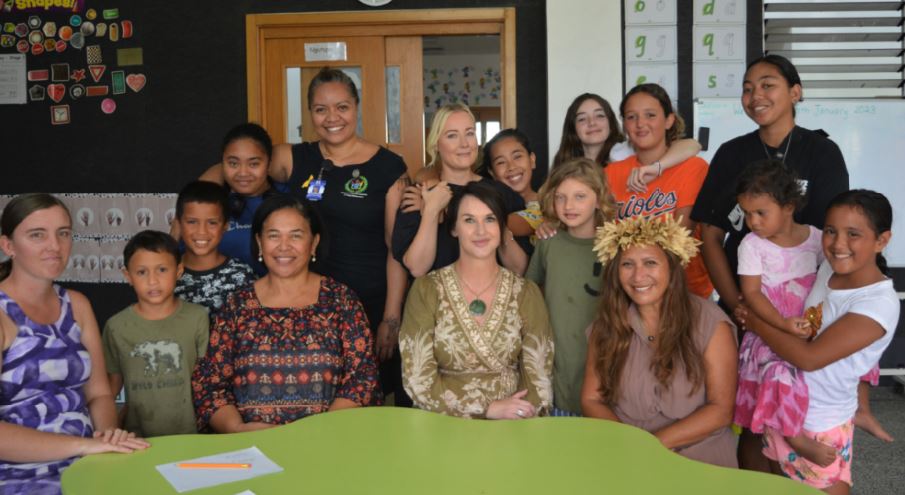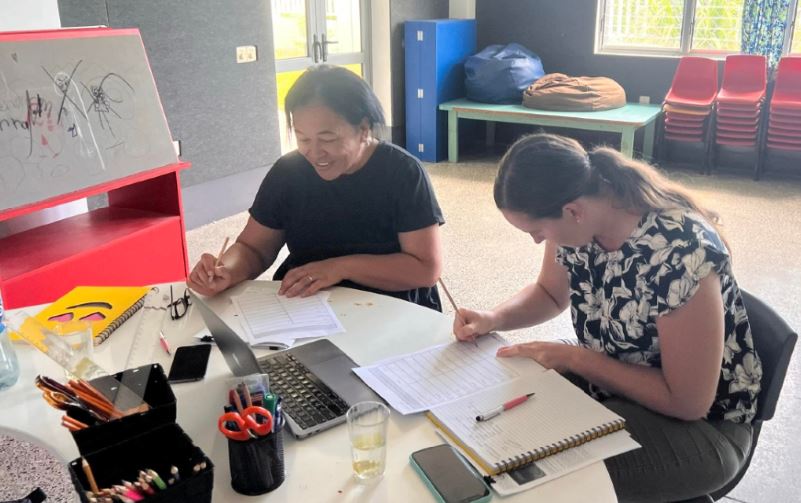Unlocking dyslexia
Saturday 28 January 2023 | Written by Melina Etches | Published in Features, Health, Health, National, Weekend

Cook Islands Dyslexia Society is working collaboratively with Rebecca Elias and Kayleigh Harvey from New Zealand Summit Point School (SPS) which specialises in ‘Structured Literacy and Multi-Sensory, Discovery teaching for amazing dyslexic minds’. 23012525
Early childhood school days for some children have been and are a real struggle. It is particularly harder for those with dyslexia – a learning disorder that involves difficulty reading due to problems identifying speech sounds and learning how they relate to letters and words.
According to the worldwide figure, there are between 10 and 20 per cent of people on the spectrum of dyslexia.
Severe cases (those who can’t read or write) is a much smaller amount but a lot of people struggle in some way with some aspects of reading and writing.
According to the Cook Islands Dyslexia Society Incorporated (CIDSI), more children are experiencing feelings of shame and tend to get mocked when they can’t read, write or spell.
They become bored and isolated amongst their peers and this can escalate when the issue isn’t identified and remediated.
Dyslexic is genetic and extremely common, put simply, dyslexia is a different wiring of the brain and it is not a measure of intelligence.
People with dyslexia find it difficult to recognise how sounds, words and letters match up phonetically – it’s an alternative way of thinking.
To provide support for children with learning difficulties, the CIDSI is working collaboratively with Summit Point School (SPS) in Auckland, New Zealand which specialises in “structured literacy and multi-sensory discovery teaching for amazing dyslexic minds”.
In Rarotonga this week, a weeklong course was held at Apii Nikao, tutored by Rebecca Elias, the founder and principal of SPS in Auckland, and headteacher, Kayleigh Harvey. They provided professional development to former teacher Kimiora Ona and Apii Nikao teacher aide, Madeline Cowan, in a bid to help identify “specific learning differences” and support their students to reach their full potential.
Ona has over 30 years of experience as a teacher and is a member of the CIDSI board.
The Cook Islands Ministry of Education advertised to staff currently working in a support role and selected Cowan as she has a degree in Psychology and fits all the criteria around the role.
“She (Cowan) was very willing to move into the dyslexia sphere as she already has some knowledge around dealing with and supporting people with dyslexia,” says Education’s inclusive education advisor, Andre Hansen.
Education ministry provides resources such as specialised worksheets tailored to the particular need of the student, assistive technology and professional development to teachers and teacher aides.

Kimiora Ona and Apii Nikao teacher aide, Madeline Cowan undertake the Summit Point School (SPS) course which will help to identify Specific Learning Differences and support dyslexic students to reach their full potential. 23012620
“We also have diagnostic tests which give us an indication of where the student’s needs and strengths are,” says Hansen.
“The CIDSI forms an important role as they make dyslexia known in the Cook Islands as well as help and support parents to look for solutions, assistance and hope for their children.
“Dyslexia is not classed as a learning disability, it is a different way of learning. We need to find these people, support them and then reap the benefit of their lateral thinking enquiring minds. Many people with dyslexia have become rich and famous entrepreneurs and inventors,” Hansen says.
How do you know if your child has dyslexia?
According to Elias, at about the age of eight if a child is still really slow or laboured in terms of their reading fluency, that’s a real key indicator. She says a dyslexic will always have very poor spelling and the struggle of vowel sounds.
“If kids aren’t identified and haven’t had the ability to be accessed or any support by the age of 10 then there’s no doubt there’s an issue.”
Elias is dyslexic and ADHD (Attention deficit hyperactivity disorder) – a condition that affects people’s behaviour.
“I had a dreadful time through school and left early,” she says.
Her son also has ADHD, was disciplined severely at school and also left school early.
“I don’t want other children to experience the same,” says Elias, “I want them to have the education that I deserved, that my boy deserved, that every child deserves who is struggling to learn.”
“We just don’t think and learn the way that most children do…”
This week’s course is “a deep dive into all of the areas of a diverse learner that’s not only dyslexia because dyslexic children can often have a range of other unique skills and difficulties”.
Elias has taken the approach that they are going to provide more support and cast the net wider “doing a lot of neuro biological disorders and difficulties” then drilling down into dyslexia looking into areas of the brain which impact a learner. This will be followed by teaching the linguistic approach and how to assess so the participants will be able to observe children.
With the help of technology to assess, they hope the knowledge they impart this week will help the participants identify and indicate a range of difficulties – “which is really unique and amazing, the more they do it the more understanding they have and they can help more children,” says Elias.
Kate McKessar, a member of the CIDSI, has a daughter with dyslexia attending primary school in Rarotonga for three years. She is now a student at SPS and flourishing.
“By Year 4, she was really struggling with reading and math and so we made the decision to move her to Summit Point School in Auckland, which has made a massive difference for her,” says McKessar.
“Ari is now reading beautifully and her self-esteem is so much better too.
“The school specialises in teaching Structured Literacy which is phonics based, so kids learn all the sounds to match the letter combinations, but it is also taught in a really explicit and cumulative way.
“It’s kind of like giving kids a codebreaker book so they can decode the rules of language themselves, and no longer need to guess.”
McKessar is of the opinion that Structured Literacy needs to be taught to all children. “It’s not just for dyslexic kids, but all struggling learners as well.”
Chairperson of CIDSI, Jean Francis has a personal experience with dyslexia, she raised one of her daughters (in Australia) who was struggling to read, spell and write.
“I managed it differently – in the 80s and early 90s no one was talking about dyslexia … so we got her diagnosed,” says Francis.
Francis disclosed how she would become frustrated with her daughter before she discovered her child was dyslexic.
“I felt bad as a parent, I felt absolutely tragic and then I moved … I flipped the way I was thinking, she wasn’t dumb, I just didn’t know then. I was ashamed for myself that I was treating my child that way and it broke my heart.”
Meeting several parents on Rarotonga who are in the same boat she once was, Francis says, now, they are so relieved to know about dyslexia.
Her granddaughter has genetic dyslexia and is on a programme in Australia to help her. “She’s just flourishing, so it’s really important we do this here,” says Francis.
“We are very fierce Mums on behalf of our children … and it’s so important that we keep pushing the bar and educating,” adds Francis who would like to see the SPS programme rolled out to all the schools on the island.
Francis has been driving for the SPS course to be held on Rarotonga and acknowledges that although the course is only funded for two people, its’ a start.
“I believe we need accessors in all the schools, we absolutely are sure that this is going to be a success and we can start to roll out more teachers.”
Francis is grateful and happy for the support from the Ministry of Education, saying its secretary Danielle Cochrane was “instrumental in getting the funding for this course”.
“We are very grateful to Education and the inclusive education advisor Andre Hansen and the people in our community.”
Elias is proud of the work CIDSI have done. “It’s amazing the progress they’ve managed here in such a short period of time, it’s phenomenal.”




















































